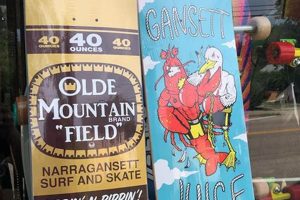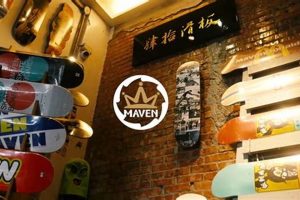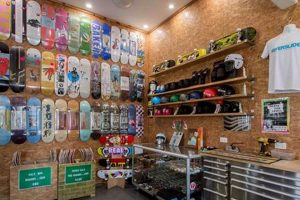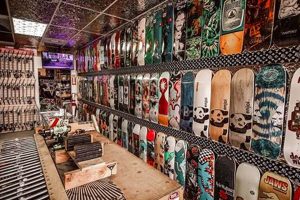The term identifies a retail establishment in Columbus that specializes in goods and services related to skateboarding. These establishments typically offer a range of skateboarding equipment, including boards, trucks, wheels, bearings, and protective gear. For example, an individual might visit such a location to purchase a new skateboard or have existing equipment repaired.
These specialized retailers serve as crucial hubs for the local skateboarding community. They provide access to necessary equipment and often foster a sense of community through events, sponsorships, and providing expertise to skateboarders of varying skill levels. The presence of such businesses supports the growth and development of skateboarding within the Columbus area, potentially impacting youth engagement in sports and recreational activities.
The following sections will delve deeper into the specific offerings, community impact, and location-specific details of these businesses, providing a comprehensive overview of their role within the Columbus skateboarding scene.
Tips from Local Skateboarding Retailers
These insights are provided based on expertise from within the skateboarding retail sector, specifically drawing upon knowledge from establishments within Columbus.
Tip 1: Prioritize Safety Gear. Helmets, knee pads, and elbow pads are essential for all skateboarders, regardless of skill level. Consistent use of protective equipment significantly reduces the risk of injury during falls and collisions.
Tip 2: Select the Appropriate Board. Board selection should align with the intended use. Beginners typically benefit from wider boards offering increased stability, while more experienced riders may prefer narrower boards for enhanced maneuverability.
Tip 3: Regularly Inspect Equipment. Conduct routine inspections of all hardware, including trucks, wheels, and bearings. Tighten loose components and replace worn parts promptly to ensure optimal performance and safety.
Tip 4: Consider Wheel Durometer. Wheel durometer, measured on the A scale, indicates wheel hardness. Softer wheels (lower durometer) provide better grip and are suitable for rough surfaces, while harder wheels (higher durometer) offer increased speed and are ideal for smooth surfaces.
Tip 5: Maintain Bearings. Clean and lubricate bearings regularly to maintain optimal performance. Dirty or dry bearings can significantly reduce speed and increase the risk of bearing failure.
Tip 6: Learn Basic Maintenance Skills. Acquiring basic maintenance skills, such as replacing wheels, bearings, and grip tape, can save time and money in the long run. Many local shops offer workshops or guidance on these procedures.
Tip 7: Seek Professional Advice. Consult with experienced staff at a local establishment regarding equipment selection, maintenance, and repair. Knowledgeable staff can provide valuable insights tailored to individual needs and skill levels.
Adhering to these recommendations contributes to a safer and more enjoyable skateboarding experience. Proper equipment selection and maintenance, coupled with a focus on safety, are crucial for maximizing performance and minimizing risk.
The subsequent sections will explore community resources and opportunities available to skateboarders within the Columbus area.
1. Equipment Availability
Equipment availability is a cornerstone of any functioning skateboarding community, and its presence within Columbus is directly influenced by the local skateboarding retailers. The range and quality of available equipment significantly impact the accessibility and progression of skateboarding within the city.
- Board Variety and Specialization
The retail landscape provides access to a diverse selection of skateboards, catering to different skill levels and skateboarding styles. Beginners can find complete boards designed for ease of use, while experienced skaters can customize their setups with individual decks, trucks, and wheels tailored to specific preferences. For instance, longboards for cruising, street boards for tricks, and transition boards for park skating are all typically available.
- Component Quality and Options
Beyond complete skateboards, retailers offer a wide array of individual components, allowing skaters to upgrade or repair their equipment. This includes trucks designed for stability or responsiveness, wheels of varying sizes and durometers optimized for different terrains, and high-performance bearings that enhance speed and roll efficiency. Access to quality components directly impacts the skater’s ability to progress and perform at higher levels.
- Protective Gear Accessibility
The availability of helmets, knee pads, elbow pads, and wrist guards is critical for safety. Columbus retailers play a crucial role in providing skaters with access to protective gear, encouraging safe skateboarding practices, and reducing the risk of injuries. Stocking a range of sizes and styles ensures that skaters of all ages and body types can find comfortable and effective protective equipment.
- Maintenance and Repair Supplies
Retailers often carry tools and supplies necessary for skateboard maintenance and repair, such as skate tools, bearing lubricant, grip tape, and replacement hardware. This empowers skaters to maintain their equipment, extending its lifespan and ensuring optimal performance. The presence of these supplies also reduces reliance on professional repairs, fostering self-sufficiency within the skateboarding community.
In summary, the robust equipment availability facilitated by the Columbus-based retail establishments is a crucial factor in supporting the local skateboarding scene. It provides access to the necessary tools for skaters of all skill levels, promotes safety, and fosters a culture of maintenance and customization.
2. Community Hub
The designation of a “Columbus skate shop” as a community hub stems from its multifaceted role within the local skateboarding scene. These establishments transcend the simple function of retail outlets; they cultivate a sense of belonging and shared identity among skateboarders of varying ages, skill levels, and backgrounds. This community-centric function is not incidental but rather integral to the survival and flourishing of skateboarding within Columbus.
The cause-and-effect relationship is evident: a “Columbus skate shop” that actively fosters community engagement tends to experience greater customer loyalty and overall success. Practical examples include hosting skateboarding events such as competitions, demonstrations, and beginner workshops. These events draw skateboarders together, providing opportunities for skill development, social interaction, and the exchange of knowledge. Additionally, many shops sponsor local skateboarders, providing them with equipment and support, thereby contributing to their visibility and inspiring other members of the community. The shop often becomes a central meeting point before and after skating sessions, strengthening social bonds and facilitating informal mentorship opportunities.
The practical significance of understanding this connection lies in its implications for the long-term health of the skateboarding community. Recognizing and supporting establishments that actively cultivate a community hub environment ensures the continued growth and accessibility of skateboarding within Columbus. These spaces provide not only access to equipment but also mentorship, support, and a sense of belonging, essential elements for fostering participation and progression within the sport. Failure to recognize and nurture this aspect risks the fragmentation of the community and a decline in skateboarding engagement. Ultimately, “Columbus skate shop” can play an important role within the community by not only selling goods but fostering engagement and creating an area of belonging.
3. Expert Advice
Expert advice is an essential, though often underestimated, element of the “columbus skate shop” dynamic. The connection stems from the specialized knowledge required to navigate the complexities of skateboarding equipment and techniques. Unlike general sporting goods stores, a dedicated establishment provides access to staff with firsthand experience and in-depth understanding of skateboarding, which is the direct cause of receiving reliable advice. This expertise enables customers to make informed decisions regarding board selection, component compatibility, and safety considerations.
The practical significance of this expertise is multifaceted. For beginners, guidance on selecting the appropriate board size, wheel durometer, and truck tightness can significantly impact their learning curve and overall enjoyment of the sport. For experienced skaters, expert advice assists in optimizing equipment for specific styles of skating or addressing performance issues. “Columbus skate shop” personnel may offer insights into new product releases, emerging trends, or troubleshooting techniques based on their practical experience and industry knowledge. Furthermore, they provide essential advice regarding safety protocols, protective gear selection, and risk mitigation strategies, which are critical for minimizing injuries and promoting responsible skateboarding practices. For example, a “Columbus skate shop” employee might guide a customer in selecting the appropriate helmet size and fit, or provide recommendations for strengthening specific muscles to prevent common skateboarding injuries.
In conclusion, the availability of expert advice within a “Columbus skate shop” setting is a vital component of a healthy skateboarding community. It facilitates informed decision-making, promotes safety, and enhances the overall skateboarding experience for individuals of all skill levels. Recognizing and supporting these establishments ensures the continued availability of specialized knowledge, contributing to the sustained growth and development of skateboarding within the Columbus area. This reliance on expertise can offset reliance on solely online opinion which is very hard to vet for validity.
4. Repairs/Maintenance
The availability of repairs and maintenance services at a “columbus skate shop” is inextricably linked to the longevity and accessibility of skateboarding within the community. This connection is a direct consequence of the wear and tear inherent in skateboarding, which necessitates regular upkeep and occasional repairs to ensure equipment functionality and safety. A “columbus skate shop” offering these services directly addresses this need, providing skateboarders with a convenient and reliable resource for preserving their equipment. For instance, a skater experiencing worn bearings or damaged grip tape can seek immediate assistance, preventing further damage or potential injury. Without such services, skateboarders would face limited options, potentially resorting to makeshift repairs or premature equipment replacement, thereby increasing costs and hindering their participation.
The practical application of repairs and maintenance extends beyond simple fixes. A skilled technician at a “columbus skate shop” can identify and address potential issues before they escalate into major problems, prolonging the lifespan of skateboards and components. This proactive approach not only saves skateboarders money in the long run but also contributes to a more sustainable skateboarding culture by reducing waste and promoting responsible equipment stewardship. For example, a technician might detect early signs of stress fractures in a deck, preventing a catastrophic failure during a skating session. Additionally, the presence of repair services fosters a deeper understanding of skateboard mechanics among community members, as they can learn valuable maintenance tips and techniques from experienced professionals. This educational aspect empowers skateboarders to take ownership of their equipment and develop a greater appreciation for the craft.
In conclusion, the provision of repairs and maintenance by a “columbus skate shop” is not merely a supplementary service; it is a fundamental component of a thriving skateboarding ecosystem. It ensures equipment longevity, promotes safety, fosters self-sufficiency, and contributes to a more sustainable and accessible skateboarding culture. The absence of readily available repair services would inevitably lead to increased costs, reduced participation, and a decline in the overall health of the local skateboarding community. Thus, supporting establishments that prioritize repairs and maintenance is essential for the continued growth and vitality of skateboarding in Columbus.
5. Brands Selection
The connection between brands selection and “columbus skate shop” is direct and causative. The brands stocked by a given establishment dictate the range of products available to local skateboarders, influencing their choices and ultimately shaping the local skateboarding culture. The selection directly impacts product availability, quality, and the shop’s overall appeal. A limited brand selection can restrict skaters to inferior products or force them to seek alternatives elsewhere, diminishing the shop’s role within the community. For example, a shop that only carries low-end brands might not cater to experienced skaters seeking high-performance components, or those with specialized needs such as longboarding or vert skating. Conversely, a shop with a diverse brand selection, including both established names and emerging brands, caters to a broader spectrum of skaters.
A comprehensive brand selection allows the “columbus skate shop” to fulfill diverse customer needs. Stocking brands known for durability, performance, and innovation provides skaters with access to high-quality equipment that enhances their skating experience and reduces the risk of equipment failure. The ability to offer various brands allows the retailer to present options at different price points, thus catering to both budget-conscious beginners and experienced skaters willing to invest in premium gear. A well-curated brand selection also demonstrates the shop’s commitment to skateboarding culture, signaling that the retailer is knowledgeable about current trends and invested in supporting the skateboarding community. Furthermore, partnerships with specific brands often grant the shop access to exclusive products or promotional opportunities, further enhancing its appeal and solidifying its position as a key resource for local skaters.
In summary, the brands selection within a “columbus skate shop” is a critical factor influencing its success and impact on the local skateboarding scene. A well-curated selection caters to diverse needs, provides access to quality equipment, and demonstrates a commitment to skateboarding culture. Shops with limited brand options risk alienating potential customers and diminishing their role within the community. The ability to offer a comprehensive and diverse brand selection is a key differentiator for a “columbus skate shop” and a fundamental driver of its long-term viability and influence.
6. Local Events
Local events represent a significant facet of the “columbus skate shop” ecosystem, serving as both a consequence and a driver of community engagement. These events contribute to the visibility of the shop and the vitality of the skateboarding scene within Columbus, fostering a symbiotic relationship.
- Competitions and Demonstrations
Local skateboarding retailers frequently organize or sponsor competitions and demonstrations. These events provide a platform for skateboarders of varying skill levels to showcase their abilities, generating excitement and attracting spectators. A “columbus skate shop” may contribute by providing prizes, equipment, or logistical support. The resultant increase in foot traffic and brand awareness directly benefits the retailer, while the community gains access to a competitive and entertaining outlet.
- Beginner Workshops and Clinics
Many “columbus skate shop” establishments offer workshops and clinics designed for novice skateboarders. These sessions provide a structured learning environment, teaching fundamental skills and safety practices. The retailers benefit by attracting new customers and fostering a sense of loyalty among beginners. The community gains by having access to qualified instruction, which reduces the risk of injuries and promotes the sustainable growth of skateboarding.
- Product Launches and Promotional Events
Retailers often host events to coincide with the launch of new products or seasonal promotions. These events may feature product demonstrations, giveaways, and special discounts, attracting customers and generating sales. A “columbus skate shop” may leverage these events to highlight new equipment, clear out old inventory, and interact directly with the skateboarding community. The community benefits by gaining access to the latest products and exclusive deals.
- Community Skate Days and Park Clean-Ups
Some “columbus skate shop” businesses organize community skate days or participate in park clean-up initiatives. These events promote a sense of social responsibility and demonstrate the retailer’s commitment to the local skateboarding environment. By organizing or supporting these events, the shop fosters goodwill and strengthens its ties to the community. The community benefits by having access to organized skating events and a cleaner, more sustainable environment.
In conclusion, the active involvement of a “columbus skate shop” in local events contributes significantly to the vibrancy of the skateboarding scene. These events not only benefit the retailer through increased visibility and sales but also provide valuable opportunities for community engagement, skill development, and environmental stewardship. This reciprocal relationship underscores the importance of supporting local businesses that actively invest in the well-being of the skateboarding community.
7. Promoting Skateboarding
The relationship between promoting skateboarding and a “columbus skate shop” is symbiotic. A shop’s active promotion of the sport directly influences its success and the growth of the local skateboarding community. The cause-and-effect is clear: promotional efforts increase participation, which in turn drives sales and enhances the shop’s reputation. Conversely, a lack of promotional activity can lead to stagnation, diminished community engagement, and reduced business viability. Such promotion includes sponsorship of local skaters, events, and disseminating information about skateboarding opportunities. A “columbus skate shop” sponsoring a local competition, for example, not only provides financial support but also increases the shops visibility within the community and motivates skaters to participate.
The practical significance of understanding this connection lies in recognizing that a “columbus skate shop” is more than just a retail outlet; it is a catalyst for skateboarding culture. Promotional activities can range from organizing workshops for beginners to supporting the construction of new skateparks. The dissemination of information about skateboarding safety and etiquette, often through in-store signage or online resources, is another critical aspect. Examples of successful promotional strategies include partnerships with local schools or youth organizations to introduce skateboarding as a recreational activity. These actions create a positive image of skateboarding, challenge misconceptions, and encourage wider participation. This in turn leads to increased sales of equipment and services related to skateboarding.
In summary, promoting skateboarding is an essential component of a successful “columbus skate shop” strategy. It fosters community engagement, drives sales, and contributes to the long-term growth of the sport. The challenge lies in consistently developing and implementing effective promotional initiatives that resonate with the local skateboarding community. The understanding that the shop is not only a supplier of goods, but also is a participant in skateboarding’s overall culture, is vital for it’s continued success.
Frequently Asked Questions
The following section addresses common inquiries regarding skateboarding equipment, maintenance, and community resources available through specialized retail establishments.
Question 1: What constitutes a suitable skateboard for a beginner?
A complete skateboard with a deck width between 7.75 and 8.0 inches is generally recommended for beginners. These boards offer a balance of stability and maneuverability, facilitating the learning process. Softer wheels (78a-85a durometer) are also advisable for enhanced grip on various surfaces.
Question 2: How frequently should skateboard bearings be cleaned and lubricated?
Bearing maintenance frequency depends on usage conditions. Skateboard bearings subjected to dirt, water, or sand require more frequent cleaning. Under normal circumstances, cleaning and lubrication every 2-4 weeks is recommended to maintain optimal performance.
Question 3: What safety gear is deemed essential for skateboarding?
A helmet certified by a recognized safety standard (e.g., ASTM F1492) is non-negotiable. Knee pads, elbow pads, and wrist guards are strongly recommended, particularly for beginners and those attempting advanced maneuvers. Mouthguards may also be considered for added protection.
Question 4: How does one determine the appropriate truck size for a skateboard deck?
Truck width should closely match the width of the skateboard deck. A slight overhang (no more than 0.25 inches per side) is acceptable, but significant disparities can negatively impact stability and performance. Consult with knowledgeable staff for precise recommendations.
Question 5: What are the key indicators of worn or damaged skateboard components?
Common indicators include excessive wheel wear, bearing noise or roughness, cracks or delamination in the deck, and bent or damaged trucks. Regularly inspecting equipment for these signs is crucial for safety and performance.
Question 6: How can one locate local skateboarding communities and resources within Columbus?
Specialized retail establishments often serve as hubs for the local skateboarding community. Consult with staff for information on skateparks, organized events, and local skateboarding groups. Online forums and social media groups dedicated to Columbus skateboarding can also provide valuable resources.
The answers presented herein serve as general guidelines. Individual needs and preferences may necessitate adjustments. Consulting with experienced staff at a reputable establishment is recommended for personalized advice.
The subsequent sections will explore available resources and pathways for engagement within the Columbus skateboarding environment.
Columbus Skate Shop
The preceding analysis has elucidated the multifaceted role a “columbus skate shop” plays within the city’s skateboarding ecosystem. Beyond a mere retail establishment, it functions as a vital source of equipment, expert advice, repair services, community engagement, and promotional support. Its impact extends to safety, sustainability, and the overall health of the skateboarding scene. Understanding this intricate relationship is crucial for participants, stakeholders, and observers alike.
The sustained viability and influence of “columbus skate shop” depend on a concerted effort to recognize and nurture its diverse functions. Continued support for these establishments, coupled with active participation in local skateboarding initiatives, is essential for fostering a vibrant, accessible, and safe environment for skateboarding enthusiasts of all levels. The future of skateboarding in Columbus hinges, in part, on the recognition and preservation of these essential community pillars.







